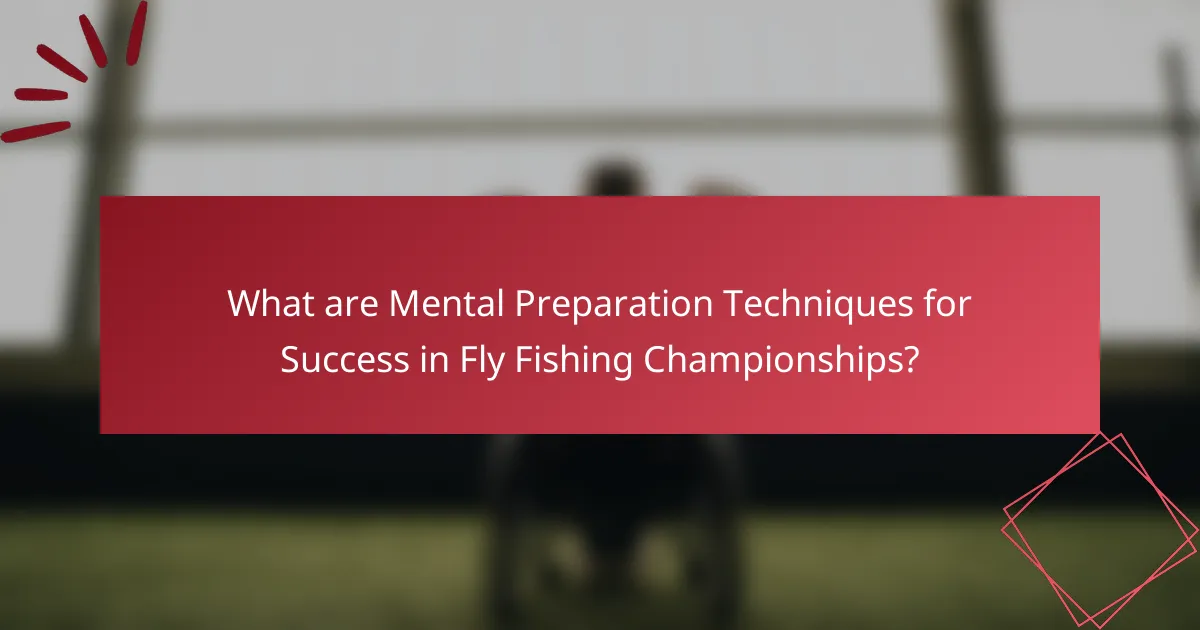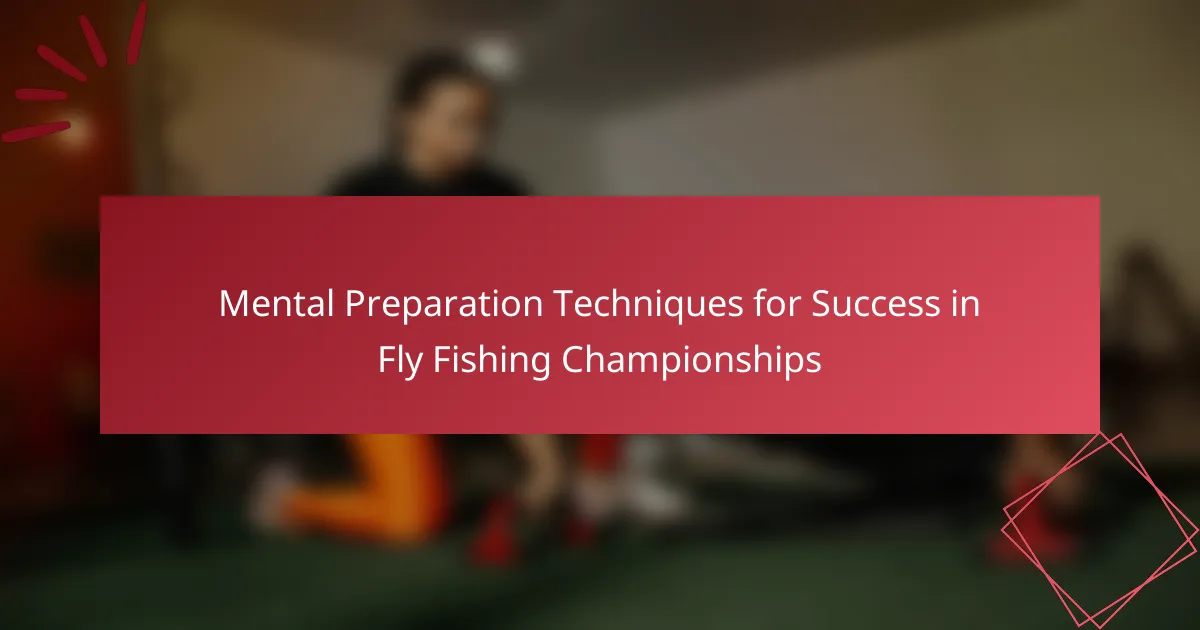Mental preparation techniques are essential for success in fly fishing championships. Key strategies include visualization, where athletes imagine successful scenarios to enhance performance, and goal setting, which helps competitors establish clear, achievable objectives. Additionally, mindfulness practices, such as deep breathing, are employed to reduce anxiety and improve concentration. Research indicates that mental rehearsal can significantly enhance motor skills, making these techniques vital for competitive fly fishing success. Collectively, these methods contribute to improved focus, motivation, and overall performance in the sport.

What are Mental Preparation Techniques for Success in Fly Fishing Championships?
Mental preparation techniques for success in fly fishing championships include visualization, goal setting, and mindfulness. Visualization involves imagining successful scenarios to enhance performance. Athletes often visualize casting techniques and the feeling of catching fish. Goal setting helps competitors define clear, achievable objectives. Specific targets can improve focus and motivation. Mindfulness practices, such as deep breathing, reduce anxiety and increase concentration. Research shows that mental rehearsal can enhance motor skills, making it a valuable technique. These methods collectively contribute to improved performance in competitive fly fishing.
Why is mental preparation important in fly fishing championships?
Mental preparation is crucial in fly fishing championships because it enhances focus and decision-making. Competitors face varying conditions that require quick, strategic responses. A well-prepared mindset allows anglers to adapt to environmental changes effectively. Research shows that mental training can improve performance by reducing anxiety and increasing confidence. For instance, a study published in the “Journal of Sport Psychology” highlights how visualization techniques can lead to better outcomes in competitive settings. Therefore, mental preparation significantly influences an angler’s success in championships.
What psychological factors influence performance in competitive fly fishing?
Psychological factors that influence performance in competitive fly fishing include focus, anxiety management, and confidence. Focus is crucial for maintaining concentration on techniques and strategies during competition. High levels of anxiety can negatively impact performance by causing distractions and impairing decision-making. Confidence plays a significant role in a competitor’s ability to execute skills effectively. Research indicates that mental imagery can enhance focus and confidence, improving overall performance. Studies show that athletes who practice visualization techniques tend to perform better under pressure.
How does mental preparation differ from physical training in fly fishing?
Mental preparation in fly fishing focuses on psychological strategies, while physical training emphasizes developing physical skills. Mental preparation includes visualization, stress management, and focus techniques. These methods help anglers build confidence and enhance decision-making during competitions. Physical training involves practicing casting techniques, improving strength, and building endurance. Anglers often engage in repetitive drills to refine their skills. Research indicates that mental skills can significantly impact performance, with studies showing that athletes who employ visualization techniques often outperform those who do not.
What are the key mental preparation techniques used by successful fly anglers?
Successful fly anglers utilize several key mental preparation techniques. Visualization is a primary technique where anglers mentally rehearse their fishing strategies. This helps them anticipate challenges and plan responses effectively. Another technique is mindfulness, which keeps anglers focused on the present moment. This reduces anxiety and enhances decision-making during fishing. Positive self-talk is also crucial. Anglers affirm their skills and abilities to boost confidence. Goal setting is important as well; it provides clear targets for performance. Research indicates that these techniques improve focus and reduce stress, leading to better outcomes in competitive settings.
How can visualization enhance performance in fly fishing competitions?
Visualization can enhance performance in fly fishing competitions by improving focus and mental clarity. This technique allows anglers to mentally rehearse their casting techniques and strategies. By visualizing successful outcomes, competitors can build confidence and reduce anxiety. Research indicates that athletes who practice visualization experience improved performance metrics. For instance, a study by Dr. Richard Suinn demonstrated that mental imagery positively impacts athletic performance. Visualization helps anglers anticipate challenges and devise solutions in real-time. This mental preparation can lead to better decision-making during competitions. Overall, visualization is a powerful tool for enhancing performance in fly fishing.
What role does mindfulness play in mental preparation for fly fishing?
Mindfulness enhances mental preparation for fly fishing by promoting focus and reducing anxiety. It helps anglers remain present, improving their ability to observe their surroundings. This heightened awareness can lead to better decision-making while fishing. Research shows that mindfulness practices can decrease stress levels, which is crucial in competitive environments. A study published in the Journal of Sport Psychology indicated that athletes who practiced mindfulness reported improved performance and concentration. Therefore, integrating mindfulness into fly fishing preparation can significantly enhance an angler’s mental state and overall success.
How can goal setting improve focus and success in fly fishing championships?
Goal setting can significantly improve focus and success in fly fishing championships. By establishing clear and specific goals, anglers can direct their efforts toward achieving measurable outcomes. This process enhances concentration by providing a roadmap for practice sessions and competition strategies. Research indicates that goal-oriented individuals are more likely to stay committed and motivated, leading to better performance. For example, a study published in the Journal of Sport Psychology found that athletes who set specific performance goals improved their results by up to 20%. Additionally, goal setting fosters a sense of accountability, encouraging anglers to track their progress and adjust their techniques as needed. Overall, effective goal setting aligns mental preparation with competitive success in fly fishing.
What common challenges do anglers face in mental preparation for competitions?
Anglers commonly face challenges such as anxiety, overthinking, and lack of focus during mental preparation for competitions. Anxiety can stem from the pressure to perform well. This pressure may lead to negative self-talk, which affects confidence. Overthinking can cause anglers to second-guess their strategies and decisions. This often results in indecision and decreased performance. Lack of focus can arise from distractions both on and off the water. Anglers may struggle to maintain concentration, which is crucial for success. These challenges can hinder their ability to execute techniques effectively during competitions.
How can anxiety affect performance in fly fishing championships?
Anxiety can negatively impact performance in fly fishing championships. High levels of anxiety may lead to decreased focus and concentration. Fishermen may struggle to make quick decisions under pressure. Physical symptoms of anxiety, such as increased heart rate, can hinder fine motor skills. Research indicates that anxiety can impair cognitive functions essential for strategy execution. A study by Beilock and Carr (2005) found that anxiety disrupts performance in sports requiring precision. Thus, managing anxiety is crucial for optimal performance in competitive fly fishing.
What strategies can help overcome mental barriers in competitive fly fishing?
Visualization techniques can help overcome mental barriers in competitive fly fishing. Athletes can mentally rehearse their casting and retrieval techniques. This practice boosts confidence and reduces anxiety. Mindfulness meditation can enhance focus during competitions. It helps anglers remain present and calm under pressure. Setting specific, achievable goals can also be beneficial. This strategy allows for measurable progress and builds motivation. Additionally, positive self-talk can counter negative thoughts. Affirmations can reinforce a competitive mindset. Engaging in pre-competition routines can create a sense of familiarity. This reduces uncertainty and enhances performance. These strategies are widely recognized in sports psychology for improving mental resilience.
How can anglers assess their mental preparation effectiveness?
Anglers can assess their mental preparation effectiveness by reflecting on their performance and emotional state during fishing. They should evaluate how well they maintained focus and composure in challenging situations. Recording their thoughts and feelings before, during, and after fishing can provide insights. Comparing outcomes with personal goals can also highlight areas of strength and weakness. Feedback from peers or coaches can offer additional perspectives. Studies show that self-reflection enhances mental resilience, which is crucial for competitive success. Regular assessments can lead to improved strategies and techniques over time.
What indicators suggest strong mental readiness for fly fishing competitions?
Indicators of strong mental readiness for fly fishing competitions include focused concentration, emotional regulation, and positive visualization. Focused concentration allows anglers to remain attentive to their techniques and surroundings. Emotional regulation helps manage stress and anxiety during competitions. Positive visualization involves imagining successful outcomes, which can enhance performance. Research indicates that athletes who practice these mental techniques perform better under pressure. For instance, a study published in the Journal of Sport Psychology found that mental imagery significantly improved competitive outcomes in various sports.
How can self-reflection improve mental preparation techniques?
Self-reflection can enhance mental preparation techniques by promoting self-awareness and clarity. It allows individuals to evaluate their thoughts and feelings before competitions. This evaluation helps identify strengths and weaknesses in their mental approach. A study by Grant and Cavanagh (2007) found that self-reflection improves performance by fostering goal-setting and motivation. Additionally, self-reflection aids in developing coping strategies for stress. This process can lead to better focus and concentration during fly fishing championships. Overall, self-reflection is a critical tool for optimizing mental readiness.
What practical tips can enhance mental preparation for fly fishing championships?
Practicing visualization can enhance mental preparation for fly fishing championships. Athletes should imagine themselves successfully executing techniques and strategies. This method can build confidence and reduce anxiety. Setting specific goals also aids in mental focus. Goals should be measurable and achievable, such as targeting a specific number of casts per session.
Developing a pre-competition routine can create consistency and comfort. Routines help in managing stress and maintaining focus. Mindfulness techniques, such as deep breathing, can improve concentration. Engaging in regular physical exercise can also benefit mental clarity. Research indicates that physical activity enhances cognitive function and reduces stress levels.
Lastly, reviewing past performances can provide valuable insights. Analyzing successes and areas for improvement fosters growth and readiness.
Mental preparation techniques are essential for achieving success in fly fishing championships. Key strategies include visualization, goal setting, and mindfulness, which enhance focus, reduce anxiety, and improve decision-making. The article explores the importance of mental preparation, the psychological factors affecting performance, and how these techniques differ from physical training. Additionally, it addresses common challenges anglers face, strategies to overcome mental barriers, and practical tips for enhancing mental readiness. Overall, effective mental preparation significantly influences competitive outcomes in fly fishing.
